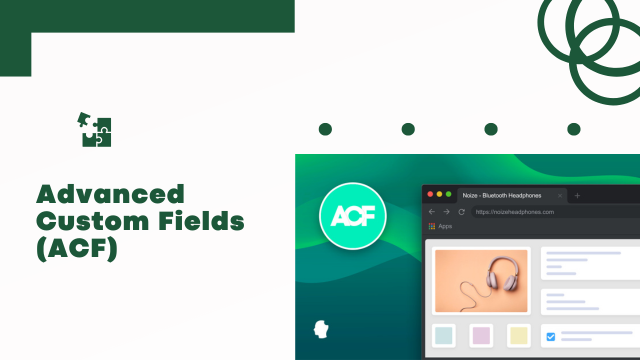Advanced Custom Fields (ACF): The Complete Guide to Customizing WordPress
Introduction
WordPress and Google now have something in common: they are both identified as powerful CMSs. That is just an introduction as to why developers or website owners would want to create scalable dynamic and customizable websites. Surely, one of such things is WordPress. Customizing content and features becomes easier without much coding knowledge. Using this popular plugin, Advanced Custom Fields (ACF), it’s possible to add fields to custom content: pages, posts, and all other types. Here is a brief overview of this very important plugin, its operation, and how it makes it easier to build custom content into advanced WordPress websites.
Advanced Custom Fields (ACF): What exactly is it
Just as it suggests, ACF is a plug-in for WordPress, making it easier for developers and site owners to attach additional fields to their sites. Custom fields are some other items of metadata attached to a post, a page, or a custom post type that let you store extra content, such as text or images, or other media. They can improve downloading certain features and looks of your site without directly editing core WordPress files.
Highlighted Features of ACF
1.Custom Field Type: There are different types of fields like text, number, image, file upload, checkbox, radio button, select dropdown, relationship field, etc., which can be used to capture numerous contents to be shown on the site’s front-end.
2.Field Groups: When it comes to custom fields, field groups can create field organizing related custom fields: post, page, custom post type, category.
3.Conditional Logic: According to its name, ACF can define conditions under which certain fields should appear or remain hidden-for example, creating a field that should only show in an event of a specific occurrence of another field.
4.Flexible Content Field: This is the most powerful ACF. The Flexible Content Field lets you create dynamic layouts through repeatable layout additions with different types of fields, fantastic for creating complex content structures.
5.ACF Blocks: Using ACF Blocks, developers can build custom Gutenberg blocks with ACF, which are reusable, rich content elements within the WordPress block editor.
6.API Integration: ACF has a powerful API that developers can use to access and display their custom fields in WordPress templates, providing full flexibility for building WordPress themes and plugins.
Advanced applications of ACF include
1.Using ACF to create your own custom post types and taxonomies. ACF will allow you to work with any custom post type perfectly, generating incredible content types for your site. For example, you might make use of a portfolio section or product catalog by adding additional data with custom fields or something similar like a directory of your team members.
2.Custom made options page creation: ACF will offer the creation of custom built options pages. It may use for the settings that are global in nature for the site-wide accesses. Such usage will be very beneficial in giving integration parameters like uploading logos, social media links, contact information, etc.
3.Flexible content field: Create complex layouts that span multiple types of content as the flexible content field quite easily allows. You can have as many layouts as you like, adding different sets of fields to design dynamic and reusable content blocks.
4.Dynamic Content Visibility in the Relationships and Repeater Fields: You can connect one form of content with another using Relationships and Repeater fields in ACF. For example, you can relate your blog post to some product or team members with related projects. The Repeater field allows the same section of fields to be repeated multiple times and is very useful in displaying a list of items such as testimonials or product features.
Conclusion
ACF (Advanced Custom Fields) is a very usable tool that allows WordPress developers to turn an average site into high customization and dynamic site. This user interface and the field types available in it allow the creation of custom fields with ease for a website that matches the need of the particular project. ACF does all that, whether the site to build is a simple blog or a complex content-driven site. Using its more critical features like flexible content, repeater fields, and ACF Blocks, you can now create fantastic content layouts and make the user more comfortable with the layout while providing a cleaner way to manage content.
ALSO READ THIS: The Surfer SEO Extension Is A Great Tool For Content Optimization.
The Surfer SEO Extension Is A Great Tool For Content Optimization.

